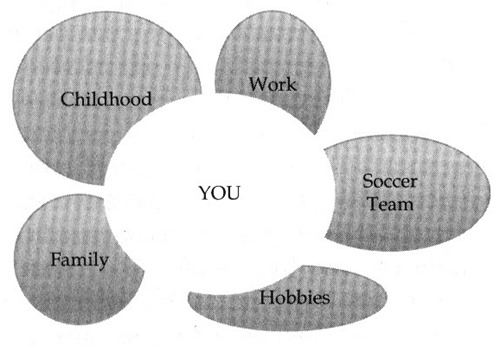Adam Blatner
Words and Images from the Mind of Adam Blatner
The Self Illusion
Originally posted on March 7, 2013
Recently I was pleased to discover a book with this title written by Bruce Hood, a professor of Developmental Psychology in Society at the University of Bristol, England. Subtitled “how the social brain creates identity,” (Oxford University Press, 2012) this book brings forth a good many aspects of psychology that are evaluated from the viewpoint of how people feel about themselves. It also notes the power of the new medium of computer games wherein people present their avatars and enjoy—or suffer from—the reactions of others to them. All this lends depth to a paper “On Self-ing” (as a process) I wrote and posted on my website in 2006.
I made the point that what we call the “self” is really an aggregate experience that seems like it’s one “thing.” I used the word “self” as a verb—to self, to create a composite figure based on many elements (some mentioned on the website). Hood notes yet other inputs, and these strengthen the case: In a good illustration on page 293 he writes, “The self illusion is an emergent property from the cluster of external influences.” I’d agree with the first part of the sentence, but instead of external influences, I’d use the term “roles.” 
It’s a good enough book, a contribution to the field, but I didn’t feel he addressed what we should do about it, so I’ll say it again here: We should teach psychology and talk about it as if we are a mixture of a single individual (not divided) and also pluralistic. (A paper about “role dynamics” is on my website, with links to an extensive bibliography.) We are individual insofar as we are responsible for how we play our roles, and we can learn how to play them better. We are pluralistic in that our “self” is an aggregate of many parts. The dramaturgical metaphor works here: We are the director and playwright of an ongoing improvisational show—sometimes a circus, sometimes a strikingly non-dramatic, quiet evening at home. We can learn to become more sharply aware of our roles and our tendency to continue to play them as we have in the past. We can learn to modify the way we play those roles, and in this way, we can become more creative and effective.
This all fits with a plan I have to promote psychological literacy—a way of becoming more psychologically-minded in a user-friendly way, based on the way we play our roles. I suspect I may have to explain this a lot before it catches on. So anyway, this book gets added to what I may write some day about role theory or how people can be more creative in their everyday life.
Categories
- Action Explorations
- Art (Mandalas, Doodles, Scripts)
- Autobiographical
- Book Reviews
- Current Events
- Essays and Papers
- Follies
- Foolin Around
- History
- Mind-Spectrums
- My Favorite Things
- Play and Spontaneity
- Psychodrama
- Psychological Literacy
- Psychology
- Psychotherapy and Psychiatry
- Scriptology
- Social-Depth Psychology (Sociometry)
- Spirituality and Philosophy
- Uncategorized
- Whassup?
- Wisdom-ing
- World of Almost-Real
- Zordak's Journal
Archives
- October 2021
- August 2020
- January 2020
- November 2019
- March 2019
- August 2018
- July 2018
- June 2018
- May 2018
- April 2018
- March 2018
- February 2018
- January 2018
- December 2017
- November 2017
- October 2017
- September 2017
- August 2017
- July 2017
- April 2017
- March 2017
- February 2017
- January 2017
- December 2016
- November 2016
- October 2016
- September 2016
- August 2016
- July 2016
- May 2016
- April 2016
- March 2016
- February 2016
- January 2016
- December 2015
- November 2015
- October 2015
- September 2015
- August 2015
- July 2015
- June 2015
- May 2015
- April 2015
- March 2015
- February 2015
- January 2015
- October 2014
- September 2014
- July 2014
- June 2014
- May 2014
- April 2014
- March 2014
- February 2014
- January 2014
- December 2013
- November 2013
- October 2013
- September 2013
- August 2013
- July 2013
- June 2013
- May 2013
- April 2013
- March 2013
- February 2013
- January 2013
- December 2012
- November 2012
- October 2012
- September 2012
- August 2012
- July 2012
- June 2012
- May 2012
- April 2012
- March 2012
- February 2012
- January 2012
- December 2011
- November 2011
- October 2011
- September 2011
- August 2011
- July 2011
- June 2011
- May 2011
- April 2011
- March 2011
- February 2011
- January 2011
- December 2010
- November 2010
- October 2010
- August 2010
- July 2010
- June 2010
- May 2010
- April 2010
- March 2010
- February 2010
- January 2010
- December 2009
- November 2009
- August 2009
- July 2009
- June 2009
- April 2009
- March 2009
- February 2009
- December 2008
- October 2008
- September 2008
- August 2008
- July 2008
- June 2008
- May 2008
- April 2008
- March 2008
- February 2008
- January 2008
- December 2007
- January 2007
- December 2006
- September 2006
- December 2005
- October 2005
- February 2005
- December 2004
- October 2004
- May 2004
- July 2003
- October 2002
- September 2002
- August 2002
- July 2002
- June 2002
- August 2001
- December 1980
- December 1979
Leave a Reply